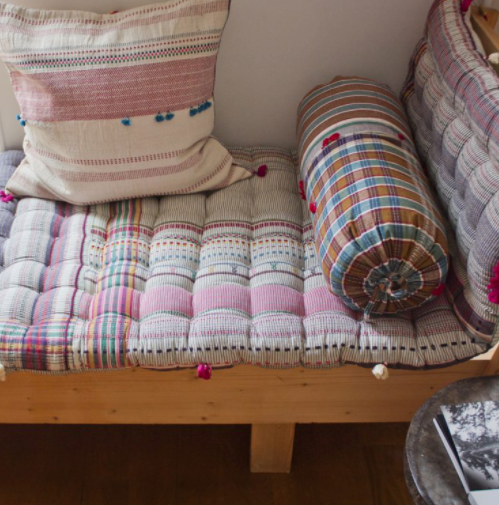Your Cart is Empty
May 24, 2023 2 min read

Injiri is entirely based on the idea of celebrating the process of hand-woven and hand-crafted Indian textiles; the collection are little stories about the textiles they are made of, and are reflective of the process. Their inspiration comes from local styles of rural India and other folk cultures from around the world.
Chinar Farooqui cultivated a love of hand-loomed fabrics while pursuing her master’s degree in textile design at the National Institute of Design in Ahmedabad, India. Now, she incorporates hand-weaving and other artisanal practices into her home wares Injiri collection. Working from her studio in Jaipur, Farooqui has developed a network of hand-loom collectives across India, from Gujarat to West Bengal who work with organic cottons and natural dyes to produce a range of exquisite handmade homewares that reside under the brand Injiri.
The word Injiri is derived from the name the Kalabari people of the Nigerian delta gave to their preferred Madras plaid fabric. Their location on the Niger delta favoured an economy based on fishing and trade. Originally, the Kalabari traded for vegetables and grain but quickly became textile traders. Oral tradition suggests a five hundred year history of this trade, predominantly from India.
Injiri, also known as Real India is a madras plaid: a yarn-dyed, hand-woven fabric featuring plaid (tartan pattern formed by horizontal and vertical stripes), striped, or checked patterns in blue/black, off-white, and red/orange combinations. Of all the trade cloths that passed through Kalabari hands, it was the trade cloth from India that came to have the greatest material significance in both their ritual and daily life.
This export to Nigeria became a significant part of the GDP of south eastern India so when in 1976 and 1983 Nigeria experienced political turmoil and banned imported goods, the weavers of Hyderabad and Madras experienced severe poverty. The Indian government stepped in to support the cultural importance of the hand looming process and the cultural fabric developed around it. This is one of the techniques incorporated in to Studio Chinar’s glorious home textile collection - Injiri. This is why the woven stripes and plaids are so much a part of this wonderful collection. Other specialised techniques like intricate ikat and shibori dying and delicate hand knotted tassels and button detail are handmade, passing through many hands and different ateliers to achieve the final product.
The care is evident in the detail; the pleasure is in the use.
